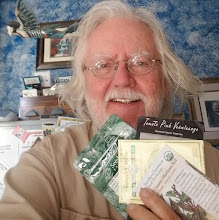
Any document signed by Wendell Berry, Wes Jackson, Bill McKibben, and Alice Waters bears a considerable look over. Such a document does exist appended with some fourteen thousand other signatures online at http://fooddeclaration.org/.
The document opens with the following paragraph:
We, the undersigned, believe that a healthy food system is necessary to meet the urgent challenges of our time. Behind us stands a half-century of industrial food production, underwritten by cheap fossil fuels, abundant land and water resources, and a drive to maximize the global harvest of cheap calories. Ahead lie rising energy and food costs, a changing climate, declining water supplies, a growing population, and the paradox of widespread hunger and obesity.
And the rest of the document reads just as poignantly.
As we look ahead, some of us see the future increasingly fraught with the difficulties observed in the document. Signing this document is valuable, although it is only a small step in a very long journey. (I can’t help but wonder about the the folks who signed as ‘anonymous;’ how much more anonymous do you need to be than simply your name in a list on the internet? That really shows some heady determination of support – I’ll be sure to count on them!)
The document’s intent is to influence the future of the United States agricultural policy. Our food policy, as dictated by our so-called "Farm Bill," has been misguided over the past fifty some odd years and I doubt that an internet document will help change it. My name is there, but it didn’t take long to put it there and I think it will have about as much affect on the policy wonks. It may influence a number of citizens to become more aware of the harmful policies of our government that enable obesity and diabetes in children, destroy farming communities and a farming ethic, ruin the economies of the family farm and wreck the environment all for the profit of larger corporations. The farm policy of the United States is one of the most harmful policies our government has ever promulgated. Because it is known as the “Farm Bill” many Americans pay it no mind; however, should it be called the “Consumer Bill” because there is no reason to farm without the end consumer, as has been suggested, then perhaps more of us would sit up and pay notice.
We need to change and do a lot more than simply sign an online petition. Fundamental changes are necessary but what you do will be defined by your own situation, still everyone can contribute to the solution rather than the problem. I know when I first looked at this problem, a friend of mine had purchased a Prius and was all on about her righteous contribution to the solution. I felt oppressed. I couldn’t buy a Prius and because I need to haul things, I needed my SUV. I felt guilty. I couldn’t do what I thought I needed to do to be a part of the change.
That was the wrong approach. I had to get used to the fact that I couldn’t do those things and once I did overcame my feelings of impotence, I could seek out the things I really could do. One of the first ones that came to my attention was to drive the speed limit because that saves fuel and puts out less greenhouse gas than speeding – I am not known for a light foot on the pedal. It is still a battle, but I’m working on it. I hadn’t planned on having to deal with some feelings about being the old man in the slow vehicle holding up traffic. I never expected to be that guy!
But what can we do about FOOD? That is the big question and that is where we can all start to make a fundamental shift that would make the above petition superfluous.
Each of us can do something to change the way America eats by changing the way we eat and the emphasis we put on our own food.
If I want to eat clean healthy and fresh food, I need to find out how I can get it. The first way is to grow it myself, but like millions of Americans, I can’t grow all of my own calories on my patio and I won’t be able to supply even most of them with a plot at a community garden. But I can grow some and some of that can be a valuable contribution to my spending plan and to my caloric intake. Next, what I don’t grow, perhaps I can trade with a fellow gardener at the community garden. If I have too much basil and they have a yellow tomato I covet, perhaps an accommodation can be made.
But there are squashes and other land intensive crops that we simply won’t grow in a 14 foot square plot. The next stop is the farmers’ market. Here in Southern California, there is a market within striking distance almost every single day of the week, with three or four or more available close at hand on Saturday and Sunday. Almost all the basic vegetables are available in season (and what long seasons we have!) from farms producing locally. Not all are within the 100 mile diet limit, but most are and those that aren’t are pretty darn close, and if opposed to the 1500 mile figure applied to most supermarket food, they are plenty close enough!
If those methods fail, then one can choose to do without or go to the supermarket. If we diligently apply this model to our food consumption, most of the damage done to the environment by food production and shipping will become financial unsustainable – we will be able to see it getting more expensive as time goes on at any rate. I propose this set of guidelines rather than trying to adhere to the hard and fast rules of the 100 mile diet and Plant Animal Miracle proposal of Kingsolver’s wonderful book. Those certainly do point us in the way to go, but for many city dwellers, they simply ask too much of most consumers.
Whatever it is you can do and are willing to do, please do it now. As we make our choices towards a different future, the other choices, the next steps, will become more apparent and more palatable, while also becoming ever more effective. We have to start here, where we are because we can start no where else.
david









.jpg)
1 comment:
Thanks for your support - see also another organization focusing on Sec of Ag at http://fooddemocracynow.org
Post a Comment